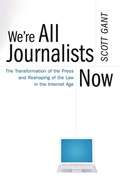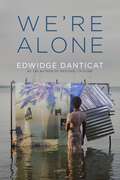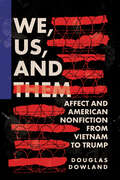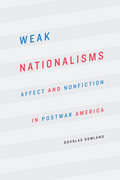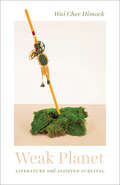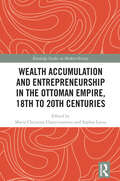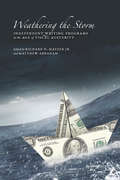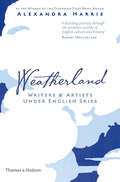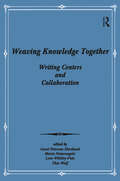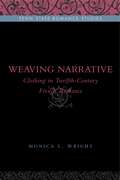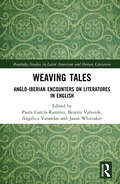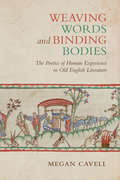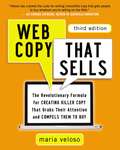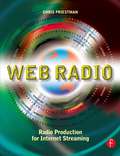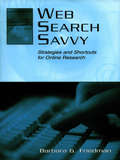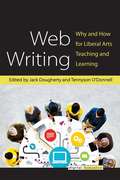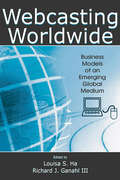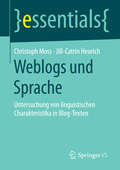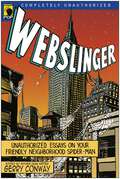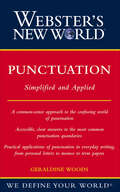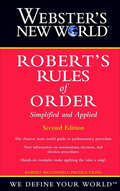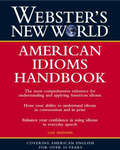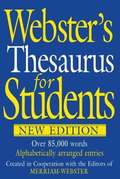- Table View
- List View
We're All Journalists Now
by Scott GantAs the internet continues to reshape almost all corners of our world, no institution has been more profoundly altered than the practice of journalism and distribution of information. In this provocative new book, Scott Gant, a distinguished Washington attorney and constitutional law scholar, argues that we as a society need to rethink our notions of what journalism is, who is a journalist and exactly what the founding fathers intended when they referred to "the freedom of the press." Are bloggers journalists, even if they receive no income? Even if they are unedited and sometimes irresponsible? Many traditional news organizations would say no. But Gant contends otherwise and suggests we think of these sometimes unruly online purveyors of information and opinion as heirs to those early pamphleteers who helped shape our fledgling democracy. He gives us a persuasive and engaging argument for affording bloggers and everyone else who disseminates information and opinion in the U.S. the same rights and privileges that traditional journalists enjoy. The rise of the Internet and blogosphere has blurred the once distinct role of the media in our society. It wasn't long ago that the line between journalists and the rest of us seemed relatively clear: Those who worked for news organizations were journalists and everyone else was not. Those days are gone. On the Internet, the line has totally disappeared. It's harder than ever to answer the question, "Who is a journalist?" Yet it is a question asked routinely in American courtrooms and legislatures because there are many circumstances where those deemed "journalists" are afforded rights and privileges not available to the rest of us. The question will become increasingly important as the transformation of journalism continues, and bloggers and other "citizen journalists" battle for equal standing with professional journalists. Advancing arguments that are sure to stir controversy, Scott Gant leads the debate with a serious yet accessible discussion about whether, where, and how the government can decide who is a journalist. Challenging the mainstream media, Gant puts forth specific arguments about how to change existing laws and makes elegant suggestions for new laws that will properly account for the undeniable reality that We're All Journalists Now. For all of us who care about the ways in which the digital revolution is sweeping through our culture, this is a work of opinion that will be seen as required reading.
We're Alone: Essays
by Edwidge DanticatA collection of exceptional new essays by one of the most significant contemporary writers on the world stage Tracing a loose arc from Edwidge Danticat’s childhood to the COVID-19 pandemic and recent events in Haiti, the essays gathered in We’re Alone include personal narrative, reportage, and tributes to mentors and heroes such as Toni Morrison, Paule Marshall, Gabriel García Márquez, and James Baldwin that explore several abiding themes: environmental catastrophe, the traumas of colonialism, motherhood, and the complexities of resilience.From hurricanes to political violence, from her days as a new student at a Brooklyn elementary school knowing little English to her account of a shooting hoax at a Miami mall, Danticat has an extraordinary ability to move from the personal to the global and back again. Throughout, literature and art prove to be her reliable companions and guides in both tragedies and triumphs.Danticat is an irresistible presence on the page: full of heart, outrage, humor, clear thinking, and moral questioning, while reminding us of the possibilities of community. And so “we’re alone” is both a fearsome admission and an intimate invitation—we’re alone now, we can talk. We’re Alone is a book that asks us to think through some of the world’s intractable problems while deepening our understanding of one of the most significant novelists at work today.
We, Us, and Them: Affect and American Nonfiction from Vietnam to Trump (Cultural Frames, Framing Culture)
by Douglas DowlandWhen Americans describe their compatriots, who exactly are they talking about? This is the urgent question that Douglas Dowland asks in We, Us, and Them. In search of answers, he turns to narratives of American nationhood written since the Vietnam War—stories in which the ostensibly strong state of the Union has been turned increasingly into an America of us versus them. Dowland explores how a range of writers across the political spectrum, including Hunter S. Thompson, James Baldwin, and J. D. Vance, articulate a particular vision of America with such strong conviction that they undermine the unity of the country they claim to extol. We, Us, and Them pinpoints instances in which criticism leads to cynicism, rage leads to apathy, and a broad vision narrows in our present moment.
Weak Nationalisms: Affect and Nonfiction in Postwar America
by Douglas DowlandThe question “What is America?” has taken on new urgency. Weak Nationalisms explores the emotional dynamics behind that question by examining how a range of authors have attempted to answer it through nonfiction since the Second World War, revealing the complex and dynamic ways in which affects shape the literary construction of everyday experience in the United States. Douglas Dowland studies these attempts to define the nation in an eclectic selection of texts from writers such as Simone de Beauvoir, John Steinbeck, Charles Kuralt, Jane Smiley, and Sarah Vowell. Each of these texts makes use of synecdoche, and Weak Nationalisms shows how this rhetorical technique is variously driven by affects including curiosity, discontent, hopefulness, and incredulity. In exploring the function of synecdoche in the creative construction of the United States, Dowland draws attention to the evocative politics and literary richness of nationalism and connects critical literary practices to broader discussions involving affect theory and cultural representation.
Weak Planet: Literature and Assisted Survival
by Wai Chee Dimock“Exploring weakness and vulnerability from the origins of American literature to the present, she provocatively argues for ‘collateral resilience.’” —Viet Thanh Nguyen, Pulitzer Prize–winning authorVulnerability. We see it everywhere. In once permanent institutions. In runaway pandemics. In democracy itself. And most frighteningly, in ecosystems with no sustainable future. Against these large-scale hazards of climate change, what can literature teach us? This is the question Wai Chee Dimock asks in Weak Planet, proposing a way forward, inspired by works that survive through kinship with strangers and with the nonhuman world.Drawing on Native American studies, disability studies, and environmental humanities, Dimock shows how hope can be found not in heroic statements but in incremental and unspectacular teamwork. Reversing the usual focus on hegemonic institutions, she highlights instead incomplete gestures given an afterlife with the help of others. She looks at Louise Erdrich’s and Sherman Alexie’s user-amended captivity narratives; nontragic sequels to Moby-Dick by C. L. R. James, Frank Stella, and Amitav Ghosh; induced forms of Irishness in Henry James, Colm Tóibín, W. B. Yeats, and Gish Jen; and the experimentations afforded by a blurry Islam in works by Henri Matisse, James Joyce, Ezra Pound, and Langston Hughes. Celebrating literature’s durability as an assisted outcome, Weak Planet gives us new ways to think about our collective future.“Weak Planet invites us to reflect on the deep interconnections between two threatened extinctions: that of the humanities and that of a host of animal species (not least our own). The book is nothing short of a radical reorientation of literary history.” —Stephen Best, author of None Like Us: Blackness, Belonging, Aesthetic Life
Wealth Accumulation and Entrepreneurship in the Ottoman Empire, 18th to 20th Centuries (Routledge Studies in Modern History)
by Maria Christina Chatziioannou Sophia LaiouThis book provides a significant contribution to our understanding of the Ottoman Empire’s economic history, particularly through its exploration of local entrepreneurship, which brings new perspectives to the economic dynamics of the region.This focus adds a valuable dimension to the broader narrative of Mediterranean social and economic developments from the 18th to the 20th century. By emphasizing the role of both Muslim and non-Muslim agents, the work challenges more Eurocentric narratives that have often influenced the historiography of economic activities in this region. The inclusion of Ottoman, Turkish, and Greek sources underlines the importance of accessing voices and records that have been underutilized in previous studies. The fact that this project is a result of Greek–Turkish academic cooperation is particularly noteworthy, as it promotes a more nuanced and comprehensive view toward shared histories in order to shed light on complex historical phenomena.This work will be of interest to scholars of Ottoman and Mediterranean history seeking to explore the nuances of economic and social change from within the Ottoman Empire. It will also appeal to a wider audience interested in the history of early entrepreneurial activities and the complex interplay between cultural and economic dynamics in historical contexts.
Weathering the Storm: Independent Writing Programs in the Age of Fiscal Austerity
by Matthew Abraham Richard N. MatzenWeathering the Storm assesses the socioeconomic and political conditions that have surrounded the rise of independent writing programs (IWPs) and departments. Chapter contributors look at the institutional conditions and challenges that IWPs have faced since the 1980s with a focus on enduring the financial collapse of 2008. Leading writing specialists at the University of Texas at Austin, Syracuse University, the University of Minnesota, and many other institutions document and think carefully about the on-the-ground obstacles that have made the creation of IWPs unique. From institutional naysayers in English departments to skeptical administrators, IWPs and the faculty within them have surmounted not only negative economics but also negative rhetorics. This collection charts the story of this journey as writing faculty continually make the case for the importance of writing in the university curriculum. Independence has, for the most part, allowed IWPs to better respond to the Great Recession, but to do so they have had to define writing studies in relation to other disciplines and departments. Weathering the Storm will be of great interest to faculty and graduate students in rhetoric and composition, writing program administrators, and writing studies and English department faculty. Contributors: Linda Adler-Kassner, Lois Agnew, Alice Batt, David Beard, Davida Charney, Amy Clements, Diane Davis, Frank Gaughan, Heidi Skurat Harris, George H. Jensen, Rodger LeGrand, Drew M. Loewe, Mark Garrett Longaker, Cindy Moore, Peggy O’Neill, Chongwon Park, Louise Wetherbee Phelps, Mary Rist, Valerie Ross, John J Ruszkiewicz, Eileen E. Schell, Madeleine Sorapure, Chris Thaiss, Patrick Wehner, Jamie White-Farnham, Carl Whithaus, Traci A. Zimmerman
Weatherland: Writers & Artists Under English Skies
by Alexandra HarrisA lively look at the English literary and artistic responses to the weather from Chaucer and Shakespeare to Keats and Ian McEwan In a sweeping panorama, Weatherland allows us to witness England’s cultural climates across the centuries. Before the Norman Conquest, Anglo-Saxons living in a wintry world wrote about the coldness of exile or the shelters they had to defend against enemies outside. The Middle Ages brought the warmth of spring; the new lyrics were sung in praise of blossoms and cuckoos. Descriptions of a rainy night are rare before 1700, but by the end of the eighteenth century the Romantics had adopted the squall as a fit subject for their most probing thoughts. The weather is vast and yet we experience it intimately, and Alexandra Harris builds her remarkable story from small evocative details. There is the drawing of a twelfth-century man in February, warming bare toes by the fire. There is the tiny glass left behind from the Frost Fair of 1684, and the Sunspan house in Angmering that embodies the bright ambitions of the 1930s. Harris catches the distinct voices of compelling individuals. “Bloody cold,” says Jonathan Swift in the “slobbery” January of 1713. Percy Shelley wants to become a cloud and John Ruskin wants to bottle one. Weatherland is a celebration of English air and a life story of those who have lived in it.
Weaving Knowledge Together: Writing Centers and Collaboration
by Carol Peterson Haviland; Maria Notarangelo; Lene Whitley-Putz; ThiaWolfFirst published in 1998. In a 1996 review article in College English, Elizabeth Rankin contrasted the method and epistemology of two recent books on writing pedagogy, describing one as "grounded in the experience of student writers and teachers" and the other as "academic." Rankin’s labels highlight one of the leading sources of tension in composition research—the tension between practice and theory—a tension that echoes in writing center research and publications. This collection of chapters seeks to build on the inherent collaborativeness of writing centers, capturing the voices of the student writers and tutors who are at the core of writing center work.
Weaving Narrative: Clothing in Twelfth-Century French Romance (Penn State Romance Studies #10)
by Monica L. WrightEnide’s tattered dress and Erec’s fabulous coronation robe; Yvain’s nudity in the forest, which prevents maidens who know him well clothed from identifying him; Lanval’s fairy-lady parading about in the Arthurian court, scantily dressed, for all to observe: just why is clothing so important in twelfth-century French romance? This interdisciplinary book explores how writers of this era used clothing as a signifier with multiple meanings for many narrative purposes. Clothing figured prominently in twelfth-century France, where exotic fabrics and furs came to define a social elite. Monica Wright shows that representations of clothing are not mere embellishments to the text; they help form the textual weave of the romances in which they appear. This book is about how these descriptions are constructed, what they mean, and how clothing becomes an active part of romance composition—the ways in which writers use it to develop and elaborate character, to advance or stall the plot, and to structure the narrative generally.
Weaving Tales: Anglo-Iberian Encounters on Literatures in English (Routledge Studies in Latin American and Iberian Literature)
by Jason Whittaker Paula García-Ramírez Beatriz Valverde Angélica VarandasThis collection of essays brings together a wide range of Spanish and Portuguese academics and writers exploring the ways in which our encounters with literatures in English inform our assumptions about texts and identities (or texts as identities) and the way we read them. Mapping, examining, reading and re-reading, fashioning and self-fashioning and, especially, weaving appear as appropriate images that convey the complexity and the nature of creative writing. Such a metaphor has been fundamental for the history of world literature since the Roman poet Ovid had included a tale in his Metamorphoses in which weaving, narration, uncertain identities, and the risks of telling uncomfortable truths all figure prominently. As such, these essays trace the intertwined patterns that knit texts together, weaving identities as well as undoing them and, in the process, interrogating established and official truths.
Weaving Words and Binding Bodies: The Poetics of Human Experience in Old English Literature
by Megan CavellReferences to weaving and binding are ubiquitous in Anglo-Saxon literature. Several hundred instances of such imagery occur in the poetic corpus, invoked in connection with objects, people, elemental forces, and complex abstract concepts.Weaving Words and Binding Bodies presents the first comprehensive study of weaving and binding imagery through intertextual analysis and close readings of Beowulf, riddles, the poetry of Cynewulf, and other key texts. Megan Cavell highlights the prominent use of weaving and binding in previously unrecognized formulas, collocations, and type-scenes, shedding light on important tropes such as the lord-retainer "bond" and the gendered role of "peace-weaving" in Anglo-Saxon society. Through the analysis of metrical, rhetorical, and linguistic features and canonical and neglected texts in a wide range of genres, Weaving Words and Binding Bodies makes an important contribution to the ongoing study of Anglo-Saxon poetics.
Web Copy That Sells: The Revolutionary Formula for Creating Killer Copy That Grabs Their Attention and Compels Them to Buy
by Maria VelosoWith the rise of social networks, "Twitterized" attention spans, and new forms of video content, the techniques that worked in crafting attention-grabbing, clickable, and actionable online copy a few years ago are simply not as effective today. Thoroughly revised, the third edition of Web Copy That Sells gives readers proven methods for achieving phenomenal success with their online sales and marketing efforts. They will learn to: Use psychological tactics that compel Web surfers to buy * Create effective, highly-targeted Facebook ads * Test copy to maximize response * Write online marketing video scripts that sell * Craft compelling copy forinteractive advertising banners * Produce high-converting video sales letters * And more Proven and practical, Web Copy That Sells shows how to quickly turn lackluster sites into "perpetual money machines," streamline key messages down to irresistible "cyber bites" . . . and ensure that Web copy, e-mail, and marketing communications pack a fast, powerful - and sales generating - punch.
Web Radio: Radio Production for Internet Streaming
by Chris PriestmanAnyone wanting to set up a low cost web radio station will benefit from the advice and information provided by this book. Not only will you gain technical and practical know-how to enable your station to go live, but also an appreciation of the legal and copyright implications of making radio, potentially for international audiences and in the rapidly evolving environment of the web.To succeed, your radio content will need to be carefully planned and your station properly promoted. Advice is given on taking advantage of the scalability web radio introduces for building audiences in line with your resources, for scheduled live output and for making programmes available on demand, including music, news, speech radio and audience participation. Case studies from around the world are provided to demonstrate how different radio organisations are applying the new flexibility web radio has to offer in a wide range of situations. Together with its associated website www.web-radio-book.com, the book also acts as a starting point for locating a range of sources for further advice and lines of research. Learn how to: - go live with your own low cost web radio station (either managing the server yourself or using a host service) - assess the right server set-up to handle the number of simultaneous listeners expected - get the best sound quality to your listeners- take account of the range of devices available for receiving web radio- plan your station, programming and associated website - identify and reach your audience - build audience feedback and data into your station's strategy- tackle the additional legal and ethical dimensions of radio on the web - source more detailed information
Web Search Savvy: Strategies and Shortcuts for Online Research (Routledge Communication Series)
by Barbara G. FriedmanWeb Search Savvy: Strategies and Shortcuts for Online Research provides readers of all skill levels with efficient search strategies for locating, retrieving, and evaluating information on the Internet. Utilizing her experience as a reporter working on deadline, author Barbara G. Friedman offers the most effective methods for finding useful and trustworthy data online, and presents these techniques in a straightforward, user-friendly manner.Anyone who uses the Internet for research will find much of value here, including techniques that harness the power of advanced searches to optimize search results, avoid advertising clutter, and locate low- or no-cost databases. Screen captures and diagrams illustrate the steps, rationale, and results to accompany various search strategies. This book emphasizes techniques that make the Web work for individuals rather than for advertisers, such as choosing the most appropriate search engine for the job and tweaking its advanced options to narrow a search and optimize results; identifying cost-free sources of online data; using creative approaches to locate information; evaluating the integrity of online data; and protecting the privacy of the researchers and the researched.Web Search Savvy is an essential resource for students, scholars, and practitioners in journalism and mass communications, and it offers practical and useful guidance for anyone researching information online.
Web Writing: Why And How For Liberal Arts Teaching
by Jack Dougherty Tennyson O'DonnellThe essays in "Web Writing" respond to contemporary debates over the proper role of the Internet in higher education, steering a middle course between polarized attitudes that often dominate the conversation. The authors argue for the wise integration of web tools into what the liberal arts does best: writing across the curriculum. All academic disciplines value clear and compelling prose, whether that prose comes in the shape of a persuasive essay, scientific report, or creative expression. The act of writing visually demonstrates how we think in original and critical ways and in ways that are deeper than those that can be taught or assessed by a computer. Furthermore, learning to write well requires engaged readers who encourage and challenge us to revise our muddled first drafts and craft more distinctive and informed points of view. Indeed, a new generation of web-based tools for authoring, annotating, editing, and publishing can dramatically enrich the writing process, but doing so requires liberal arts educators to rethink why and how we teach this skill, and to question those who blindly call for embracing or rejecting technology.
Webcasting Worldwide: Business Models of an Emerging Global Medium (Media Management and Economics Series)
by Louisa HaWebcasting Worldwide tackles one of the most timely topics in mass communication today—the delivery of audio and video content via the Web, or webcasting—employing a global perspective to explore the subject. It is unique in providing a theoretical framework by which to analyze business models of emerging media, and it also examines the business practices of leading webcasters in the world’s most developed broadband markets. With webcasting in its early development, the approaches discussed in this volume set the standards for the webcasting industry. Representing the major broadband markets in the world, this text is an authoritative and valuable reference for both researchers and practitioners. The chapters relate the business practices of webcasting to the media market environment and established media industries, such as television and radio, as well as government and non-profit organizations. Downloadable resources offer PowerPoint charts for use in training, education, and research, along with tables, graphs, screenshots, and hyperlinks. Webcasting Worldwide is essential reading for academic researchers and media industry practitioners, and the volume will be a useful text in advanced courses addressing media technology, media management, and international communication.For updates about the book chapters and latest commentaries on topics related to webcasting business models, please visit the Webcasting Business Models Blog at http://webcastingworldwide.blogspot.comWinner of The Association for Education in Journalism and Mass Communication Picard Award for Media Management and Economics 2007.
Weblogs und Sprache: Untersuchung von linguistischen Charakteristika in Blog-Texten (essentials)
by Christoph Moss Jill-Catrin HeurichChristoph Moss und Jill-Catrin Heurich betrachten das Phänomen, dass die Verfasser von Blogs eine eigene Sprache mit spezifischen Darstellungsformen entwickeln, in einer empirischen Untersuchung. Dazu werden Weblog-Texte, journalistische Kommentare in Onlinemedien sowie Corporate Blogs auf ihre sprachlichen Charakteristika untersucht. Weblogs haben ihren Platz im Kommunikationskanon gefunden. Sie sind aufgrund ihrer einfach strukturierten Programmierweise von Suchmaschinen leicht zu erfassen. Das macht sie inhaltlich sowie kommerziell attraktiv.
Webslinger: Unauthorized Essays On Your Friendly Neighborhood Spider-man
by Gerry Conway and Leah WilsonThe tangled web of vengeance, love, and loss woven by Spider-Man comics and films is explored in this collection of insightful essays by acclaimed writers of comics and science fiction. A variety of topics-from the superhero's sarcasm to the science behind radioactive spiders-are discussed in essays on "Turning Rage into Responsibility: A Psychology of Loss," "Love Is Selfish: Can a Hero Afford Personal Attachments?," and "Self Identity and Costume Design." The popular rival Green Goblin, the bumbling-yet-influential media, and the part New York City itself plays in stories are skillfully explored, as is the overall philosophy of mild-mannered Peter Parker and Spidey's relationship with the rest of the characters in the Marvel universe.
Webster's New World Punctuation: Simplified and Applied
by Geraldine WoodsUnsure about proper punctuation? When in doubt, look it up! THE PRACTICAL, ACCESSIBLE GUIDE TO CORRECT PUNCTUATION Whether you're writing a business report or a book report, creating an article for a newsletter, writing a note to your child's teacher, a personal letter, or a cover letter, using proper punctuation helps you make your points clearly and make a good impression. This user-friendly reference helps you quickly find the commonly accepted rule for any given situation, and even explains when to make exceptions to the rules. Webster's New World Punctuation: Simplified and Applied is packed with information and features, including: An overview of the importance of good punctuation Clear, concise explanations of difficult rules Easy-to-understand examples that make applying the rules a snap Cautions that alert you to common pitfalls An overview of punctuation in common writing formats, ranging from business letters to e-mails to desktop publishing Guidelines for citations in more formal writing
Webster's New World Robert's Rules of Order Simplified And Applied: Simplified And Applied
by RM ProductionsThis is the clearest, most useful guide to parliamentary procedure, now with new information on effective and reliable procedures for nominations, elections, ballots, balloting, and ballot counting.
Webster's New World: American Idioms Handbook (Webster's New World)
by Gail BrennerThe most comprehensive reference for understanding and using the contemporary idioms of American English—with more than 1,000 entries. Mastering the use of idiomatic language is an essential step toward achieving fluency in any language. Webster's New World: American Idioms Handbook is the ideal guide to the slang, sayings, expressions, jargon, and colloquialisms of American English—covering more than 1,000 entries. Emphasizing acquisition and application, this book explains their meanings as well as when, where, why, and how to use them. A wealth of examples helps readers understand each idiom&’s connotation and identify its appropriate context. An extensive index allows for quick and easy reference.
Webster's Thesaurus For Students
by Merriam-WebsterThis all-new edition is a must-have resource for students searching for the best word to organize and express their thoughts clearly in speech and writing. Each entry has a brief definition or shared meaning core of synonyms listed. Related words (near-synonyms) and antonyms (words of opposite meaning) help the student understand nuances of meaning. An affordable paperback, this volume is the ideal companion volume to Webster's Dictionary for Students. Features of this Book - More than 85,000 synonyms, related words, and antonyms - Alphabetically organized for quick and easy lookups.
